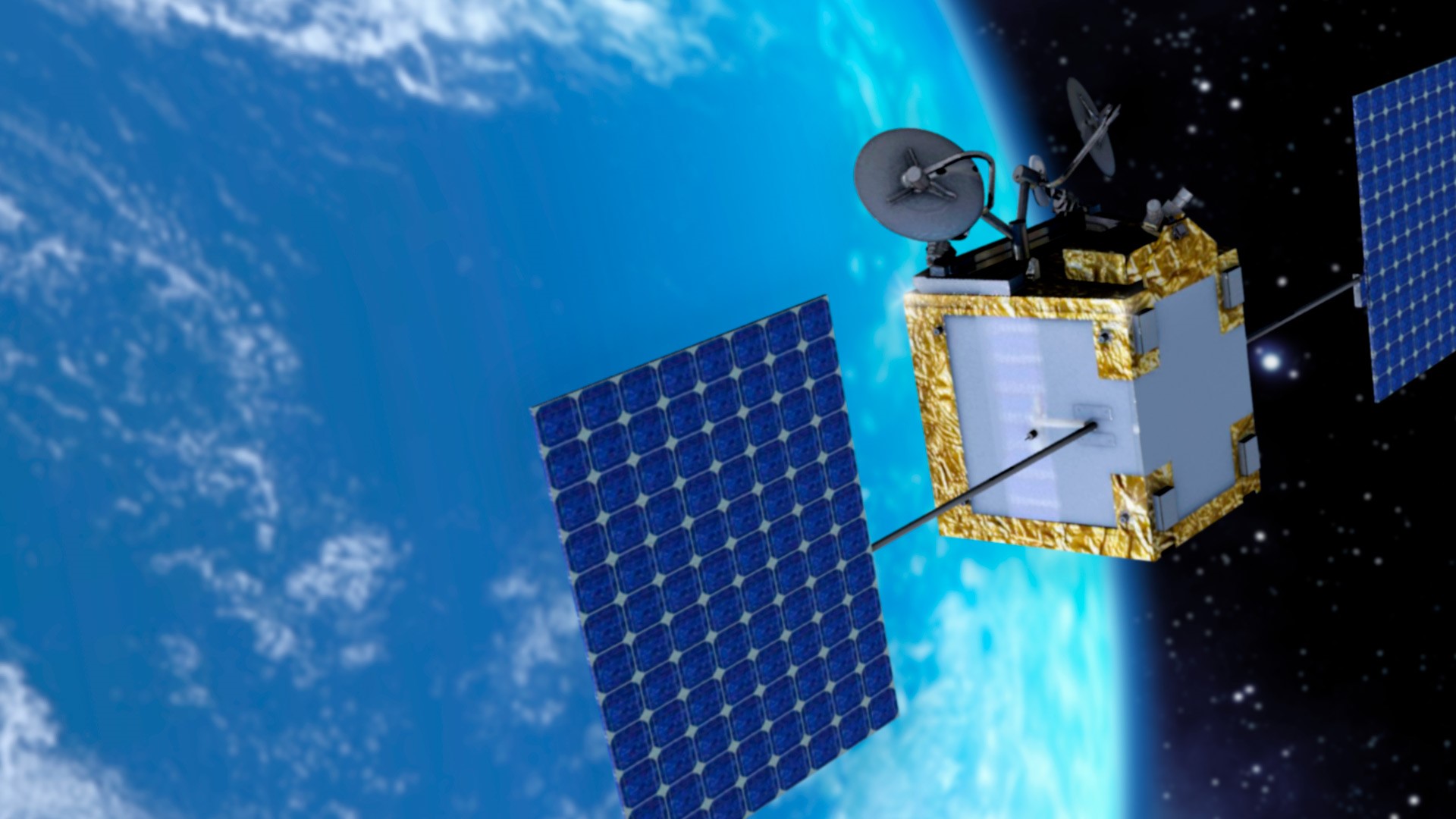What is satellite broadband?
A concept once considered to be science fiction is now widely available here in the UK, but is it any good?

If you have one of the best broadband deals for your home or business, the chances are it'll be from a fibre or ADSL fixed line connection, but did you know that you could also get your broadband via satellite?
This technology might seem like the stuff of science fiction - or just be something you mainly associate with how you get your TV channels - but the truth is that it's now a service that's widely available across the country. However, it's still not one of the most popular types of broadband we see in the UK, which begs the question of why this is the case.
In this guide, we've taken a closer look at satellite broadband in order to help you decide if it might be the right option for your broadband needs.
What is satellite broadband?
As the name suggests, satellite broadband sees your internet wirelessly beamed down from orbiting satellites to your property. As such, it's something that can technically be accessed anywhere, with the right equipment.
How does satellite broadband work?
Satellite broadband works in a similar way to satellite TV or radio. The provider beams laser signals from its base on the earth up to its orbiting satellites. These signals are then sent back down to your property from the satellite and are received by a satellite dish and transmitter you'll need to have installed - most likely on your roof.
Thanks to the use of laser technology, these signals work on higher frequencies than standard radio waves and are able to send and transmit more data and information - which is ideal for broadband.
However, much like different types of broadband, the quality of the service can depend on a number of factors. These include:
- The number of satellites in orbit - in simple terms, the more there are, the better and stronger the signal quality.
- How far away they are from us - different satellites orbit at different distances, but again if these are close to the Earth, they allow for lower latency.
- The transmission tech - the quality of the satellites and the devices used to receive the signals also matters a lot when it comes to sending and receiving data.
How do I access satellite broadband?
Right now there are a handful of satellite broadband providers that offer their services in the UK, but this number is expected to grow in the coming years. Here are the most popular options you can get in this country today:
Starlink
Arguably the most ‘well known’ is Starlink - which is operated by Elon Musk’s aerospace firm SpaceX. This has actually been available for customers to use in the UK since 2021 and has been used in many rural areas. It’s also one of the fastest providers with average download speeds of between 50Mbps and 200Mbps. It claims users typically get speeds over 100Mbps.
Eutelsat OneWeb
This provider is a combination of French provider Eutelsat and London-based OneWeb. At the time of writing it offers satellite broadband to the majority of countries around the world via its network of over 630 satellites.
Freedomsat
Freedomsat has also been around for a while but now offers a range of satellite broadband products to homes and businesses around the country. These aren’t especially fast though and most of their tariffs have data caps. However, it can be a good choice for those in remote locations.
Brdy
With Brdy you get a choice of two plans, its 50Mbps ‘Standard’ option and its 100Mbps ‘Superfast’ one - both have unlimited data. This provider claims to have over 25,000 customers across the world and promises quick delivery and self-installation. In fact, it has a number of package features that are more like a typical broadband plan.
Konnect
This provider offers its services all over the UK and promises ‘easy set-up’ and average download speeds of up to 75Mbps and data plans that can be unlimited. However, it is also technically another company that sits under the Eutelsat umbrella.
Once you've contacted a provider - and learned if you can access its services - getting connected to your new satellite broadband can be relatively straightforward. The company will send an engineer out to install a dish on your property and to fit a modem and wireless router inside it, which shouldn't take much longer than a few hours. Then, you'll be good to go.
How fast and reliable is satellite broadband?
The average download speeds of satellite broadband can vary from provider to provider, and as of 2024, the speeds on offer are slower and not as wide-ranging as fibre and Full Fibre speeds.
As aforementioned, Starlink currently has the fastest average download speeds of between 50Mbps and 300Mbps, while most other providers max out at 30-80Mbps, which isn't much faster than a typical fibre package. Although, with its steadily rising popularity, we may see more variety and faster speeds being rolled out sooner rather than later.
In terms of reliability, satellite broadband can suffer from high latency (or lag) which is due to the fact the signal is going to space and back again. This doesn't always happen, but when it does, it can affect download speeds and can cause issues with streaming. The signal can also be affected by storms and adverse weather.

Satellite broadband: FAQs
To give some more in-depth insights into this subject, here are some of the frequently asked questions people have about this particular broadband type:
Can I get any government support with my satellite broadband installation?
At the moment there aren’t any active subsidies in place. However, under the UK government’s ‘Project Gigabit’ program, there is investment in helping bring satellite broadband to ‘the most remote homes and businesses’ around the country.
In 2023, three sites - one in the North York Moors National Park, one in the Lake District and one in Snowdonia – ran trials with new satellite broadband equipment to see if fast speeds could be beamed in and utilised in these isolated areas. After these, and several other future trials have been completed, the government has said it will consider additional investment and the further development of satellite broadband to serve such locations.
How well can you stream on satellite broadband?
Most satellite broadband connections will be fast enough for you to use streaming services. However, much like moving up from ADSL broadband to fibre, if you want to stream in UHD or use multiple devices at once, you’ll struggle to do so if you’re on a slower package. You can also risk lag and weather interference that might affect the quality of the stream.
Those using satellite broadband with data caps should also be mindful of their usage, as streaming can get through your data quite quickly.
Can you online game with satellite broadband?
The honest answer is that it really depends on the quality of your connection. Most satellite broadband providers should meet the Mbps threshold you need for online gaming, but as there are so many external factors that can affect your broadband quality, you might not always get the smooth experience you’d get with a fixed-line option.
How big is a satellite broadband dish?
A satellite broadband dish is typically a similar size to a TV satellite dish, but this can vary from provider to provider. Starlink for instance has a variety of versions and some of its rectangular ones are only 12 inches wide. As such, they can be quite discreet when fitted to a building.
In what ways does the weather affect my satellite broadband?
The signal that’s beamed down to your satellite broadband dish has hundreds (and in some cases thousands) of miles to travel and these signals can get slowed or broken by everything from clouds, to storms, snow and heavy rain. This disruption then affects the quality of your broadband connection. If your dish also gets covered – by for instance, snow or dirt - it can also affect how well it receives the satellite signals.
The positive here is that these can all be rectified and aren’t constant issues due to changing weather patterns.

What does the future hold for satellite broadband?
In recent years there has been an abundance of new satellites launched by companies like Starlink that have led to improvements in the quality and speeds of this broadband type. This trend is likely to continue and what’s more, these satellites have the potential to make high speed internet available for in-flight passengers on planes and cruise ships out in the oceans.
There’s also a strong chance some mobile phone network providers will turn to this technology too, in order to improve the quality of their coverage across the world.
Should I choose satellite broadband?
As we've alluded to above, the main benefit is that satellite broadband can be accessed pretty much anywhere, but at the moment it's more for homes and businesses that can't get ADSL or fibre connections. Moreover, it tends to be more expensive than standard broadband packages that offer similar speeds and not all tariffs have unlimited data.
So with that, it's worth weighing up the following pros and cons if you're considering using it.
Pros:
- Widely available all over the country.
- Easy to get set up and you can pay monthly.
- You don't need a landline.
- Its popularity is growing.
Cons:
- It's not superfast yet and often has data limits.
- It can be expensive.
- You can experience lag and weather-related performance issues.
- There isn't as much choice on the market right now.
Alternatives to satellite broadband
One of the great things about the UK is that we’re not short on other broadband options, you can see everything that’s available in our guide here. That said, like we’ve alluded to earlier in this article, if you like a remote area, the chances are you won’t be able to access a fair few of them and satellite is likely a smart choice.
Choosing your next broadband
Ultimately, if your property doesn't have access to ADSL or fibre then satellite broadband is probably your best bet. Again, similar options include 4G and 5G broadband, but these are also subject to network coverage in your area.
If you need further assistance you can also check out our guide to choosing the best broadband provider for your needs.
Alternatively, if you want a new tariff, then you might want to head over to our best broadband deals page, or enter your postcode into our widget below. Both of these will give you a clearer idea of what broadband options you have and can help you pick the right package.
Get daily insight, inspiration and deals in your inbox
Sign up for breaking news, reviews, opinion, top tech deals, and more.
Rich is a freelance copywriter and content strategist with over 10 years' experience. His career has seen him work in-house and in various agencies, producing online and offline content marketing campaigns and copywriting for clients in the energy industry.
